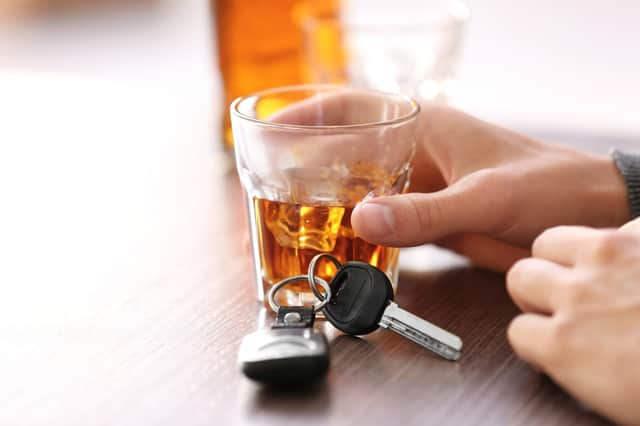Drink-driving myths busted: from refusing a test to ‘it was only a couple of drinks’


Every Christmas brings warnings about the dangers of drink driving as a minority of irresponsible partygoers risk mixing revelling with taking to the roads.
The rules on drink driving are straightforward, with clear limits and punishments for breaking them. However, there remain some myths around the issue of drink driving and more than 50,000 drivers a year are convicted of drink-driving offences.
Advertisement
Hide AdAdvertisement
Hide AdTo help clear up some of the confusion, we spoke to motoring lawyer Manjinder Kang, of Birmingham motoring specialists Kang & Co Solicitors to address some of the most common misconceptions.
If you refuse to be breathalysed you can’t be prosecuted
If you are tempted to refuse to be breathalysed to avoid being caught, think again. If you refuse to provide a specimen it is an offence, and you may face prosecution for failing to provide a specimen for analysis.
You can’t be disqualified from driving if it is going to cause exceptional hardship to your family
There are cases where you can put forward an argument in court which is called “exceptional hardship”. If you can show a ban would cause increased hardship to your family by resulting in you losing your job, risk you losing your home or unable to provide for your family, then courts can show leniency and revoke a ban.


Exceptional hardship, however, cannot be put forward when facing a prosecution for driving with excess alcohol, regardless of the impact the driving disqualification would have.
I only moved the car a short distance
Advertisement
Hide AdAdvertisement
Hide AdHow far you drive the car is irrelevant. Being behind the wheel of a car while under the influence of alcohol is an offence. When you have alcohol in your system your reaction times and perceptions are impaired which means that even moving your car a short distance to park it carries a risk and is illegal.
I was only sitting in the car, I didn’t drive it
It is an offense to be drunk in charge of a vehicle - ie. in possession of the keys - even if you are not driving. So, sitting in the car without the engine on is not a defence unless you can prove there was no likelihood of you driving the car.
I only had a couple of drinks
The legal drink drive limit is 35mcg of alcohol in breath (22mcg in Scotland) and not related to the number of drinks you consume. Different people process alcohol differently and factors including how much you drink and how quickly, your body mass index, metabolism, and the strength of alcohol all have an effect. It also depends on what drink you have. One pint of shandy is not the same as a large glass of wine or a cocktail. Trying to gauge whether you are able to drive by how drunk you feel or the number of drinks you have drunk does not work. Not drinking any alcohol while driving will always be the safest option.
I didn’t think I would still have alcohol in my system


This is one of the most common misconceptions. People think that once they have slept they won’t have alcohol in their system the next day. It takes on average an hour for every unit of alcohol you drink to leave your system. However, there is no hard and fast rule to how long it actually takes as it relies on many factors including your metabolism, alcohol strength and body mass index.
I had a big meal so it should have sobered me up
Advertisement
Hide AdAdvertisement
Hide AdNothing but time will help to get rid of the alcohol in your system as your liver chemically breaks down the alcohol and eliminates it from your body. So, even if you have a coffee, a cold shower or eat your body weight in nachos it will not help sober you up any quicker and make you fit to drive.
It was only a quick drink to settle my nerves
Known as the “hip flask” defence some drivers after a crash reach for the bottle to steady their nerves. They may not have been drinking when they had the accident but when the police turn up the driver is tested and over the limit. If you are involved in an accident, never be tempted to try and steady your nerves with alcohol, you could find yourself in a much worse position and facing a lengthy prison sentence.
You can drink and won’t get prosecuted as long as you are under the drink drive limit
Even if you produce a specimen which shows that you are under the legal blood or in breath alcohol limit you can still be prosecuted for being impaired through drink or drugs. As alcohol affects everyone differently many drivers can be significantly impaired below the legal limit. Police will carry out a Field Impairment Test and if you are shown to be “impaired” due to alcohol then you will still receive a year’s ban.
“The message is simple. If you are looking to get behind the wheel of a car no alcohol is always best,” says Manjinder.
Advertisement
Hide AdAdvertisement
Hide Ad“It is surprising how many people do not understand the law when it comes to drinking and driving and the ongoing consequences you face if convicted.
“Alcohol impairs your judgement and carries substantial risk which is why if you are driving it is always best to stick to none for the road.”
Comment Guidelines
National World encourages reader discussion on our stories. User feedback, insights and back-and-forth exchanges add a rich layer of context to reporting. Please review our Community Guidelines before commenting.
